HAPPY DAYS IS HERE AGAIN
I had never read nor seen Samuel Beckett’s absurdist classic Happy Days, now at the Mark Taper, but was excited at the prospect of seeing the great Dianne Weist in the flesh. Like many people, I’ve loved her ever since Hannah and Her Sisters, one of Woody Allen’s best films, that won her an Oscar in 1986. There is something so mindful and present about her work and here she is at her best. Her performance is intricate, layered, deep, and moving. Yet in our TV-binging culture of quick user reviews and multitasking, I must admit that encountering art that forces you to pay attention and think is bracing, if also slightly unnerving.
Ms. Weist plays Winnie, a middle-aged woman wearing a corset, who is embedded waist-deep in a hill, under a scorching sun, with a large black handbag and a parasol nearby. She putters and patters her way through various innocuous activities — brushing her teeth, checking her complexion, drinking a revitalizing tonic, putting on her hat, and laying out her possessions from the handbag, including a revolver. She talks incessantly to herself, to us, and to her husband Willie (Michael Rudko) — though he is only a peripheral presence throughout.
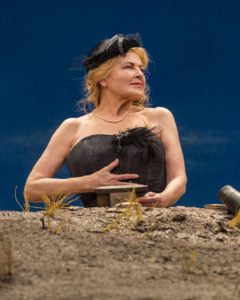 Much of what she says makes little literal sense, but it often proves to be emotionally and sexually revealing — if oblique. She prays, she makes the best of all she sees and experiences, and she keeps living, even as her existence grows smaller, and piercing alarm bells control when she must sleep and when she must wake.
Much of what she says makes little literal sense, but it often proves to be emotionally and sexually revealing — if oblique. She prays, she makes the best of all she sees and experiences, and she keeps living, even as her existence grows smaller, and piercing alarm bells control when she must sleep and when she must wake.
We find her in the second act embedded up to her neck, still wearing her hat, still with the bag and revolver beside her. Her memories are more sexually charged, though still oblique. The hill is on the verge of entombing her. Willie seems to have disappeared, but she insists on seeing the brighter side of things. Is she demented or brave? Perhaps both? Willie finally reappears, a wreck of a man, crawling up the hill trying to reach her. Or is he trying to reach for the revolver? We don’t know. Winnie sings a music box tune and takes stock of herself. The piercing alarm bells ring. It is time to sleep.
And that’s it really. No conventional plot to speak of. No easy explanations. No proscribed catharsis. Yet the sense of dread and loss is devastating. We all age if we keep living. In the mental and bodily implosion that Beckett creates for Winnie, though, I think his implication is that women of his era, compressed by domesticity and pretense, get the worst of it. Cheerfulness is weaponized as Winnie is paralyzed in a prison of graciousness, spirituality, and triviality. And the hill eats her alive.
Scenic designer Izmir Ickbal uses almost the entire stage with his brilliant, brooding hill. It seems to have a life of its own. Costume designer Alexae Visel’s and lighting designer Stephen Strawbridge’s work is equally vibrant and vital. And director James Bundy’s sure hand is as invisible as it is powerful.
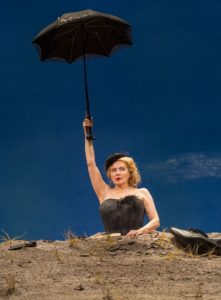 We tend to generalize anything surreal, murky, or just plain unfathomable as Theatre of the Absurd, but that’s a dumbing down of what playwrights like Beckett, Eugène Ionesco, and Jean Genet, and later Harold Pinter, Tom Stoppard, and Edward Albee, are up to. Their work has purpose and is anything but haphazard. It is every bit as constructed as a “well-made play” or a classic work in rhyming couplets for that matter.
We tend to generalize anything surreal, murky, or just plain unfathomable as Theatre of the Absurd, but that’s a dumbing down of what playwrights like Beckett, Eugène Ionesco, and Jean Genet, and later Harold Pinter, Tom Stoppard, and Edward Albee, are up to. Their work has purpose and is anything but haphazard. It is every bit as constructed as a “well-made play” or a classic work in rhyming couplets for that matter.
And Samuel Beckett is arguably the father of it all. When British theatre critic Martin Esslin invented the term Theatre of the Absurd for an essay and later his 1962 book of that title, Beckett was the first playwright whose work he explored. Esslin admired how this new style of theatre employed bold visual imagery to express, “The senselessness of the human condition and the inadequacy of the rational approach by the open abandonment of rational devices and discursive thought.”
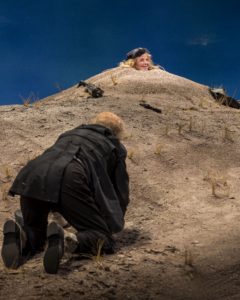 Both the limitations and the expansiveness of language is key. In Happy Days, it’s as if Winnie is trying to write her own story but can’t find the storyline or her true self. She repeatedly sighs that words fail her, as she moves between present, past, and future tenses, searching for a way to define herself but always coming up short. She falls back on marveling what happy days she has had, what a happy day she is having, and all the happy days that lie ahead.
Both the limitations and the expansiveness of language is key. In Happy Days, it’s as if Winnie is trying to write her own story but can’t find the storyline or her true self. She repeatedly sighs that words fail her, as she moves between present, past, and future tenses, searching for a way to define herself but always coming up short. She falls back on marveling what happy days she has had, what a happy day she is having, and all the happy days that lie ahead.
photos by Craig Schwartz
Happy Days
Yale Repertory Theatre production
Center Theatre Group’s Mark Taper Forum
Music Center, 135 N. Grand Ave
ends on June 30, 2019
for tickets, call 213.628.2772 or visit CTG
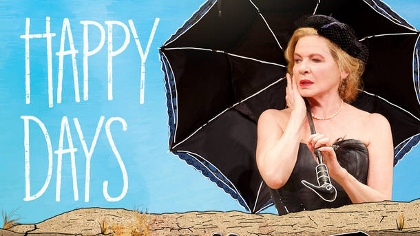
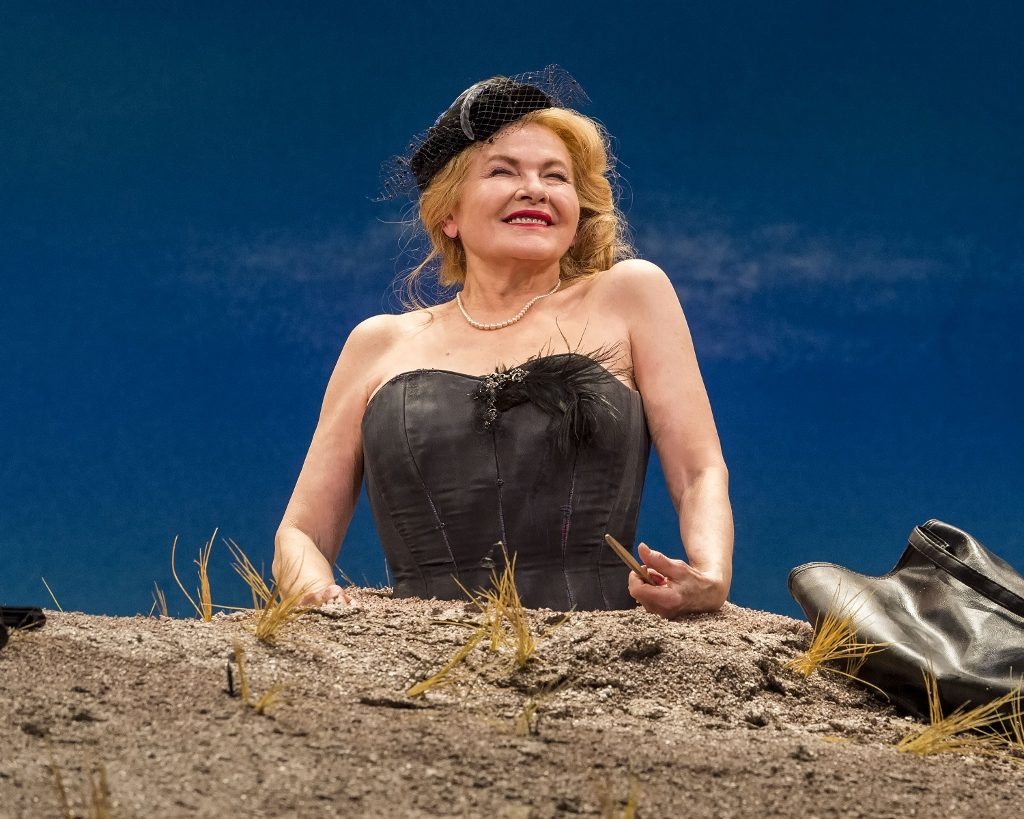
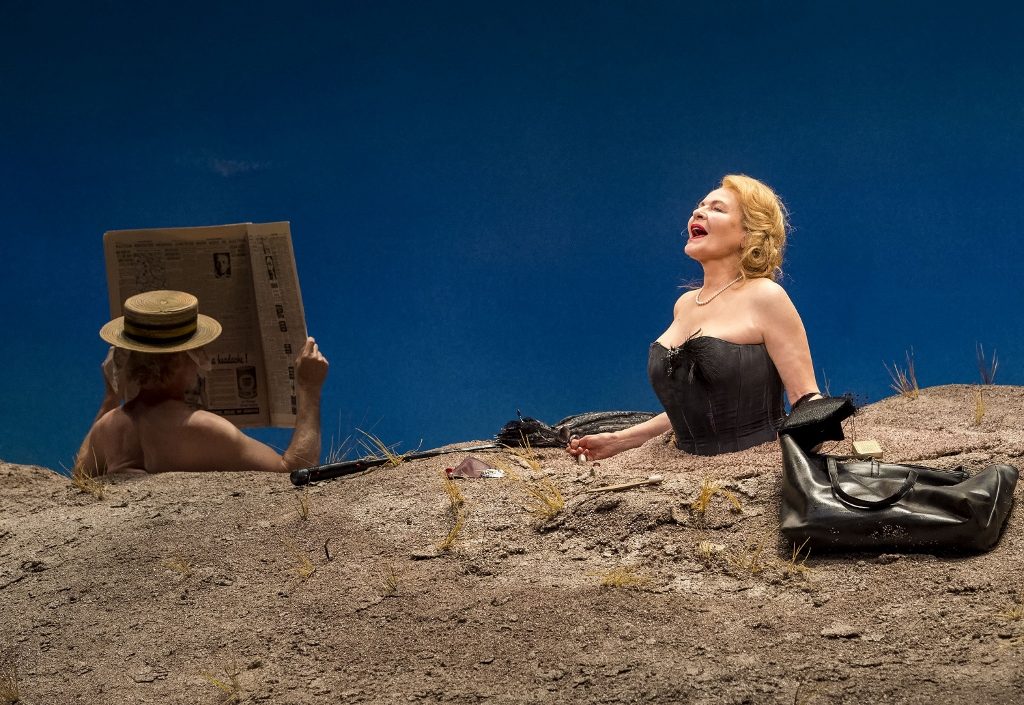
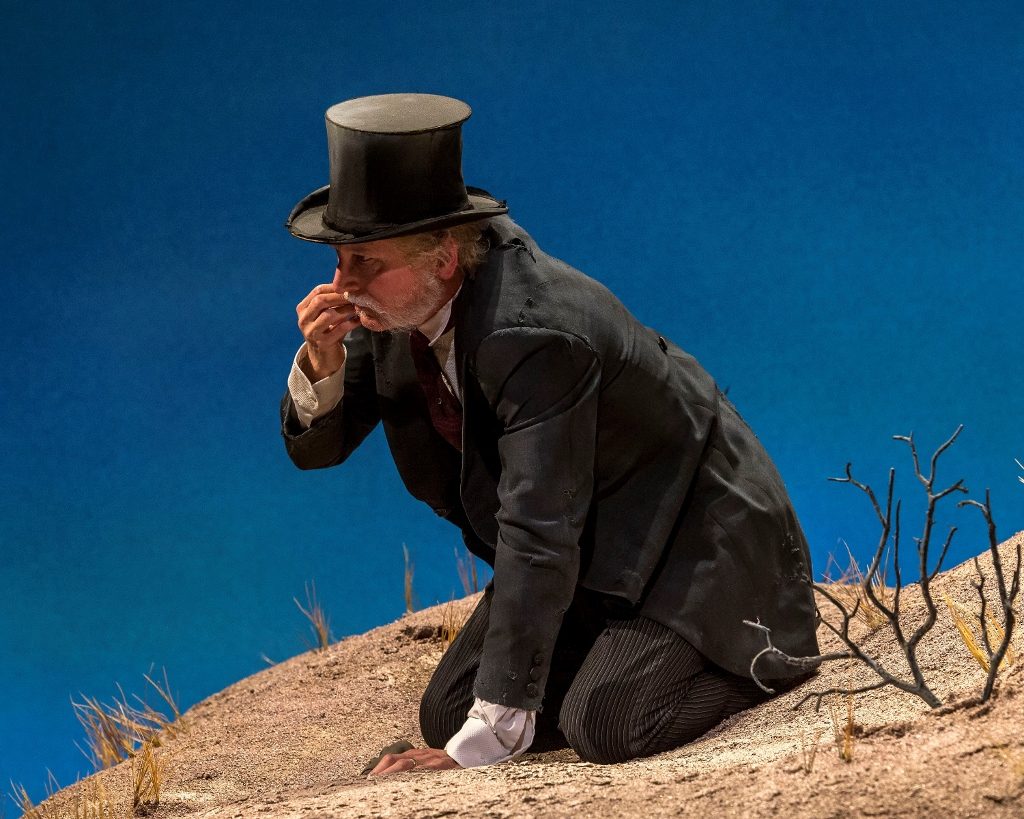

{ 3 comments… read them below or add one }
My wife and I (aged 68 and 75) simply were bored to death and could not comprehend the meaningless babble from Ms. Wiest. If this were a movie, we’d have walked out but as this was a play, we stayed until the intermission and left. This indeed was a theater of the absurd.
We really wanted to love this play. Huge fans of Diane Wiest, and certainly admire her performance. But it was simply intolerable. After an hour of the same thing happening over and over again, we just could not take it any more. Sure, life is hard. Sure, women cope with difficulty. But wow. This is bleak.
The play is full of high-minded stuff that (despite being an intellectual) I mostly don’t understand. I think you need to be a literary scholar to really appreciate it. Maybe I would like it better with study? Who knows.
The only thing I can say that is positive is that despite skipping the second act, I’m still thinking about it. Which makes sense. I strongly disliked this play, but I know that it is great art, because it haunts me.
This production is definitely NOT ‘theater of the absurd”!
I am NO ‘intellectual’, but I am ‘still thinking about it’ ! That in itself, in this day and age, is worth something…..
I would recommend seeing this production if you are open to listening and feeling, even if you don’t follow each and every word! After all, going to the theater is an experience!